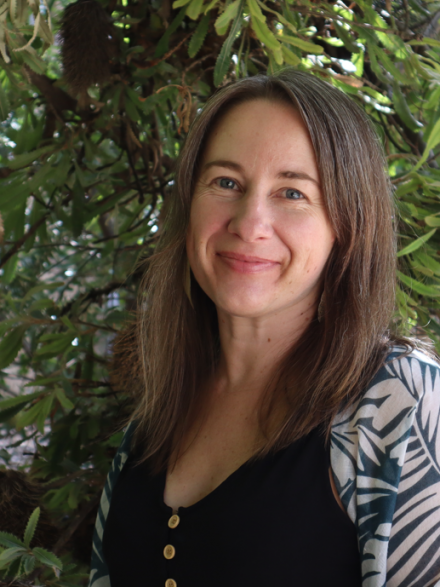Rachel Stuart (formerly England)

Contacts
Biography
Rachel is an environmental scientist/gender scholar with research and practitioner experience in the areas of gender and environmental policy, sustainable development, Defence environmental management, biosecurity and pest risk assessment/management. Born and raised on Wiradjuri country (NSW) in a coal-mining town where chunks of coal were backyard toys, Rachel is interested in the complex gendered and environmental impacts of climate change and sustainable development interventions.
Rachel has a Bachelor of Science (Botany & Zoology, with Honours) degree from The Australian National University (2002), 14 years of experience working in Federal Government and private sector consulting, and 9 years of research and teaching at ANU convening undergraduate, postgraduate and professional courses. Rachel's PhD research explores Indigenous women's ways of knowing and doing sustainable development in Australia and Vanuatu, and through this lens identifies pragmatic ways to improve policy approaches to achieve the United Nations Sustainable Development Goals (UN SDGs).
At ICEDS, Rachel is the Executive Education Manager, responsible for convening the Institute's professional learning experiences and short course program on climate change, the energy transition and disaster solutions.
Research interests
Thesis title
Indigenous women’s ways of being, knowing and doing sustainable development
Thesis description
I commenced my research with the Fenner School in late March 2016.
My PhD research is interdisciplinary, focusing on Indigenous women’s ways of living sustainably on their country, and how these ways differ to the dominant sustainable development approaches and practices of their respective States. The aim is to offer insights into how sustainable development-related policy can be informed (reformed) to reconcile with Indigenous peoples’ worldviews of sustainability and their quests for self-determination.
My two semi-comparative case studies are with and for two Indigenous communities: the White Grass people of Tanna island (Vanuatu), and the Nyikina people of the Mardoowarra (colonially known as Fitzroy River, west-Kimberley region, Western Australia).
Groups
Publications
Written publications
- Numerous consulting reports and policy documents relating to environmental impact assessment, natural resource management (NRM) programme monitoring and evaluation, and on-ground environmental monitoring. Reports are commercial or government in confidence and unable to be shared.
- Kriticos, DJ, Stuart, RM & Ash, JE. 2004. ‘Exploring interactions between cultural and biological control techniques: modeling bitou bush (Chrysanthemoides monilifera ssp. rotundata) and a seed fly (Mesoclanis polana)’, Proceedings of the 11th International Symposium on Biological Control of Weeds Conference, eds. J.M. Cullen, D.T. Briese, D.J. Kriticos, W.M. Lonsdale, L. Morin and J.K Scott, pp. 559-566. (CSIRO, Canberra).
- Stuart, RM. Chrysanthemoides monilifera. ‘Chrysanthemoides monilifera
- Stuart, RMChrysanthemoides moniliferaMesoclanis polana Proceedings of the 13th Australian Weeds Conference
- Stuart, RM. 2002. ‘A biological control model for Chrysanthemoides monilifera ssp. rotundata (Asteraceae) by Mesoclanis polana (Tephritidae)’, BSc (Hons) thesis, unpublished. (Australian National University, Canberra). (Hardcopy only available).
Presentations/Abstracts
- ‘Pacific Ocean, Pacific Climate’ 2nd Pacific Climate Change Conference, February 2018, Wellington NZ [presenter]
- Codification and Creation of Community and Customary Laws in the South Pacific and Beyond Conference, July 2018, ANU, Canberra [presenter]
- ‘Creative Conversations, Constructive Connections’ NZGS/IAG Conference, July 2018, Auckland NZ [presenter]
- Climate Change Institute Talanoa Dialogue ‘Implementing the Paris Agreement’, August 2018, ANU, Canberra [presenter and panellist]
Teaching
Convenor of the 2019 ENVS3028/6528 Environmental Policy [3rd/4th year + Masters].







